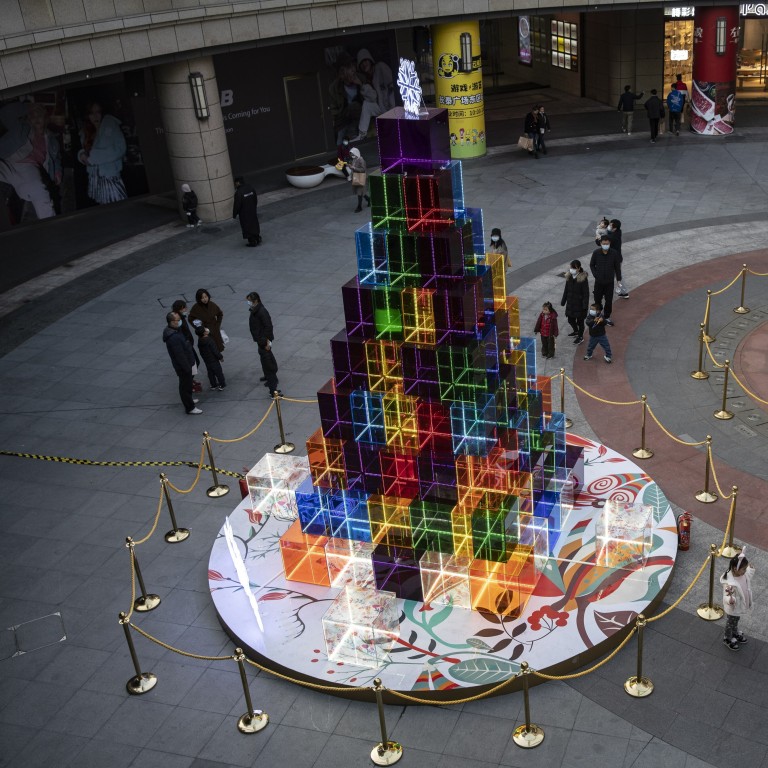
Hong Kong’s embattled retail landlords bet on their mainland malls for Christmas cheer, wooing shoppers with lavish festive displays
- Facing a dismal Christmas shopping period at home, some Hong Kong developers are trying to woo big spenders to their upmarket malls in mainland China with extravagant festive displays
- Mainland Chinese retail sales grew 5 per cent in November from a year earlier, marking the fourth successive month of expansion
“These landlords have to plough more of their resources into China where consumers can come out freely to spend to shore up sales, and compensate for whatever they are losing back home. It does not make sense to roll out elaborate displays in Hong Kong where foot traffic is really low,” said Michael Cheng, PwC’s Asia-Pacific consumer markets leader.
With Covid-19 infections largely under control, and a captive audience of domestic consumers unable to travel overseas, retail landlords are keen to attract Christmas shoppers.
Plaza 66 in Shanghai’s bustling West Nanjing Road has spared no expense this year with a 13.5-metre tall Christmas tree decorated with ornamental gift boxes in classic red and white atop of a spacious photobooth in the shape of Cartier’s iconic red jewellery box. On the other side of the mall’s outdoor plaza stands an eye-catching brass tree decked out with illuminated baubles and ribbons, designed by fashion house Dior.
The shopping centre is operated by Hong Kong’s Hang Lung Properties.
“We put in more in the Christmas campaign in China each year, and this year is no exception,” said Janice Cheung, general manager of Plaza 66. “We’ve seen much stronger recovery of consumption here than anywhere else.
“We hoped to create a Christmassy aura so people can spend a joyful time with friends at our mall, like a mini version of a vacation, since most are not able to travel overseas.”
Cheung hopes the mall’s Christmas sales will see a double-digit increase over last year’s.
China, having eased its initially strict confinement measures and allowed businesses to reopen, is expected to be the only G20 country to record positive growth this year.
Shoppers approaching another of Hang Lung’s shopping malls, in Xujiahui, one of Shanghai’s main commercial districts, are greeted by the sight of an enormous multi-coloured tree decorated by Louis Vuitton.
A 15-minute drive away two major Hong Kong developers, Swire and HKRI, have turned the HKRI Taikoo Hui shopping centre into an outdoor carnival complete with donut-themed carriage, vintage red-striped circus tent and seesaws surrounded by giant figures representing the Japanese toy Sonny Angel.
“We are very optimistic we will see robust momentum in both foot traffic and sales during the Christmas period as many people are itched to have get-togethers and celebrations at the end of a difficult year,” said a spokesperson for the mall. “[The elaborate decorations] are in line with the central government’s encouragement of domestic consumption.”
While Hong Kong-based landlords have been busy spicing up their Christmas offerings in the mainland, their malls back home, having suffered 21 straight months of sales contraction, are lacking the usual festive sparkle.
For example the ground-level plaza outside Times Square, which would normally host a vast Christmas tree, is virtually free of decorations this year. The only signs of Christmas are a decorative chandelier and some small vendor booths in the atrium.
The fourth wave of Covid-19 infections, which started in late November is certain to deliver a severe blow to the city’s retailers over the Christmas and New Year holiday season after the government extended social-distancing rules until January 6.
And the worst could well be yet to come after the government ended its Employment Support Scheme in November, meaning consumers are tightening their purse strings amid the likelihood of further salary cuts and lay-offs.
Beijing policymakers have urgently pushed a so-called dual circulation strategy to boost domestic consumption, which has delivered some good results.
“The key is that Chinese consumers now are feeling confident and secure to spend, which is in line with what we saw before Covid-19,” said Samuel Yi, director of retail at UK consulting firm Mintel.
Mintel carried out a survey in which 30 per cent of respondents in China said they visited shopping centres once a week or more in August. That is already on par with the 29 per cent before the virus hit in January. Yi expects the figure to reach 35 per cent to 40 per cent by the end of the year.

